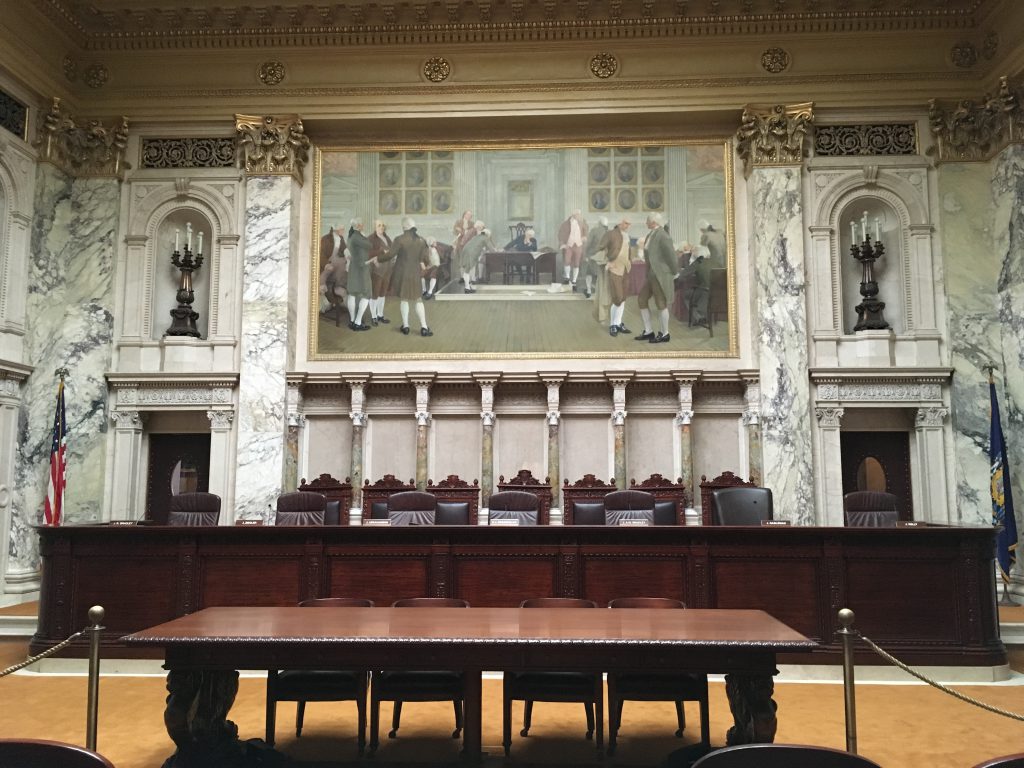State High Court Hears Arguments on Private Attorneys
Circuit court ruled that GOP legislators can’t hire attorneys before any lawsuit is filed.
On Monday the Wisconsin Supreme Court heard oral arguments in Andrew Waity v. Devin LeMahieu, the case concerning Wisconsin’s Republican legislative leaders who hired private attorneys to advise them on lawsuits that might arise over drawing the state’s new voting maps.
Wisconsin law only allows Senate Majority Leader Devin LeMahieu and Assembly Speaker Robin Vos to retain private attorneys to represent them in a particular pending court action, according to a complaint filed by four taxpayers in Dane County Circuit Court in March. Since there were no pending lawsuits related to redistricting when the legislators hired the attorneys, and new voting maps had not even been drawn, the legislators did not have the legal authority to spend thousands of dollars per month of taxpayer money to keep the private attorneys on retainer.
Ehlke also ordered the legislators to stop paying the law firms hired at taxpayer expense to represent the Wisconsin Senate and Wisconsin Assembly “in possible litigation related to decennial redistricting.” That order was blocked by the Wisconsin Supreme Court in July, allowing the payments to continue while it waited to take the case.
One of the two contracts at issue, with Consovoy McCarthy PLLC, called for paying the firm $30,000 per month for “pre-litigation counseling” starting in January and up to $965,000 in 2021.
The other, which was signed with Bell Giftos St. John LLC, called for paying the firm an hourly rate of $375.
On Monday, the court heard arguments from both sides.
Misha Tseytlin, the attorney for the legislators, stated that the taxpayers, in their brief to the Supreme Court, went “even beyond what the circuit court did,” by arguing that the Wisconsin statute “does not give the Legislature, the courts or the administrative agencies any authority whatsoever to enter into contracts, whether it’s for services or supplies to buy pens or paper and computers.”
Tseytlin asserted that Wisconsin Statute 16.74, which regulates legislative and judicial branch purchasing and also mentions contract services gives the Assembly Speaker and the Senate Majority Leader the authority to enter into legal contracts.
[inaritclead ad=”UM-In-Article-2″]The taxpayers’ original case dealt with laws passed in the Legislature’s “lame duck” session of 2018, shortly after Wisconsin elected Democratic Gov. Tony Evers, and while Republicans still held the governor’s office and both houses of the Legislature. During that time, the Legislature passed a law allowing certain Senate and Assembly committees to hire outside attorneys and intervene in lawsuits that involved challenges to state statutes, instead of relying on the (new, Democratic) attorney general.
Another statute at issue, also passed in 2018, allows employees of the Assembly, Senate, or legislative service agency to hire outside counsel for lawsuits arising from the execution of their official duties.
“Our claim is that these contracts were entered into by the Speaker and Majority Leader and they obtained legal counsel, paid by taxpayers from an unlimited budget, when no action existed,” attorney Lester Pines, who represented the taxpayers before the Supreme Court, told the Examiner. “That’s our case. We won that in the circuit court.”
But the legislators’ arguments before the Supreme Court, dealt with a different statute— the one governing the purchase of supplies and contracting for professional services.
Justices Brian Hagedorn and Patience Roggensack pursued a line of questioning that seemed to support the legislators’ argument that, since everyone knew there would likely be lawsuits arising from redistricting, it was a reasonable interpretation of the law that they could hire outside counsel in anticipation of those inevitable lawsuits.
No, Pines responded, the language of the statute was more specific than that. He quoted a Wisconsin Supreme Court decision from the 19th century, as well as the late U.S. Supreme Court Justice Antonin Scalia, who said “the specific governs over the general.”
[inaritclead ad=”UM-In-Article-3″]In his opening, Pines made an effort to appeal to religious members of the court, quoting from the Book of Genesis in the Bible and telling the story of Adam and Eve eating from the Tree of Knowledge. “That’s probably the greatest problem that we face as lawyers and judges, that people, legislators, citizens won’t take responsibility for their own behavior,” he said.
Smiling, Hagedorn, a social conservative, suggested that Pines focus on Wisconsin statutes.
“How is it that the Legislature can purchase for itself paperclips and power cords?” Hagedorn asked, bringing the discussion from the sublime back to the mundane — and where in the statutes does it say they can make those purchases, he added, but not hire lawyers?
Pines responded that the statute that governs the Assembly and Senate budgets gives them “the authority to spend that money to function in their actual constitutionally required activity which is to legislate.”
But contracts that allowed the Legislature to spend unlimited taxpayer money on private attorneys for lawsuits that haven’t even been filed opens a floodgate, Pines argued.
The court is expected to rule around the end of the year.
Wisconsin Supreme Court hears oral arguments on private attorneys was originally published by the Wisconsin Examiner.





















